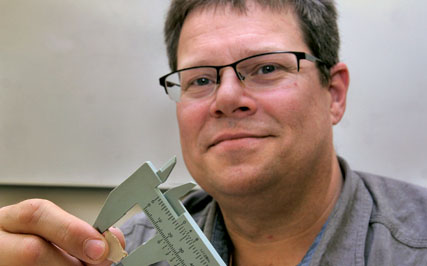Culture
Edwards hired as first Tribal archaeologist

Ask new Tribal archaeologist Briece Edwards what is the "coolest" thing he has ever found buried in the earth and you'll get two answers.
The "coolest" thing was a peahen egg shell found in a drain in Pompeii, Italy, which was destroyed by the eruption of Mount Vesuvius in 79 A.D.
"We pulled out the two halves of the shell that went together and it was over 2,000 years old," Edwards says. "And, to me, that is one of things about archaeology because it is just not the 'oh my' factor that this shell has survived, but we know what it was … we know that most likely this was being eaten because the drain came out of the kitchen. We know that peacocks are not indigenous to Italy, so this was something that had to be imported, so we're talking about status and economy. So from this one artifact, for me, I just loved how we could go different places with it. It's diet, economy, social status, trade winds … did they really like eating this?"
For personal satisfaction, however, it was the discovery of a Nehi soda bottle cap found outside of Annapolis, Md., while working on a road project.
"Probably the first artifact I ever found," Edwards says. "Wow, circa 1940."
Edwards, 45, started as the Tribe's first archaeologist on Jan. 3.
"Briece was the selection out of six candidates," says Tribal member Eirik Thorsgard, the Tribe's Cultural Protection Coordinator and Tribal Historic Preservation Officer. "His international and high level of work is what prompted his hiring. He has worked in Guatemala, Pompeii and owned his own business. His primary goal is going to be doing all of the Tribe's archaeological investigations in-house.
"In the past, we have hired outside firms to come from Portland to do this work, and now with Briece we will not need to. This should save the Tribe about $40,000 per year at a minimum; potentially much more as we develop more land in the local area.
"Additionally when we can, we may pick up contracts off-reservation which can supplement some of the budgetary draw from the Tribe and lessen the budget over time."
"The position is to do a lot of things," Edwards says. "One, is to flesh out the department, the Site Protection Program … by bringing in and creating positions, having the personnel resources to handle existing lands, historic lands, including the ceded lands, which is a very large area.
"Sixty percent of the state's population resides within Grand Ronde's ceded lands and a majority of the growth in the state also occurred within those boundaries. Through the THPO, we have the responsibility to review projects under way through federal and state negotiations."
Edwards said he will help review the 1,500 to 2,000 projects going on in the Tribe's ceded lands and hopefully shorten the 30-day review process period.
In addition, he also will be the Tribe's archaeologist on Tribal lands when it comes to monitoring new development. He'll also help survey new Tribal lands for any potential Tribal artifacts.
Edwards grew up in an academically oriented family. His mother, Michele, is a clinical psychologist and his father, Stephen, is a herpetologist.
He grew up in Kansas, where his father was associate director of the Museum of Natural History at the University of Kansas in Lawrence.
Edwards says he enjoyed going out on specimen digs in the spring with his father and his colleagues, but he was drawn more to the cultural artifacts than the bones.
"Yes, very cool to have a bison skull or the femur of a mammoth, but over here I'm finding points and lithics (stone tools)," Edwards says. "So I had an interest from that point."
He received a bachelor's degree in anthropology from the University of Maryland and a master's from North Carolina State University. He studied for his Ph.D. at the University of Bradford in England and has worked at the Smithsonian Museum of Natural History, where he concentrated on the iconography of central Asian textiles.
Before joining the Grand Ronde Tribe, he owned his own business, CRAG: Archaeology, in North Carolina, where he lived before he and his wife, Sibyl, relocated to the Pacific Northwest.
While in North Carolina, he worked in collaboration with the Catawba Indian Nation in South Carolina as a cultural resource consultant in trying to protect archaeological resources from suburban expansion occurring around Charlotte, N.C.
"My position was to be the voice or the advocate for the resource," he says.
Edwards found out about the Grand Ronde opening through Tribal member and fellow Cultural Resources employee Melisa Chandler, who took a course at the University of Oregon with Briece's younger brother.
"As a newly created position, it has the opportunity for really reinforcing the maintenance and protection of the resource … the stuff in the ground," Edwards says. "And that was a big draw for me in going after this position.
"Every nation, whether it is a Tribal nation or not, has an interest in its resources. The concern for them is always in transition. … How Tribes are going about their resources is changing and has been under change for awhile. The work that Eirik is doing in bringing an indigenous voice to the resources and the understanding of that is occurring in a lot of places.
"As an archaeologist who has been working in a variety of different contexts, this newly created position has the opportunity for setting a really strong example for how to interact with the resources, record them, process them and meet what Grand Ronde wants with those resources."
Edwards is living in Salem with his wife and their 5-year-old son, Greyson.
